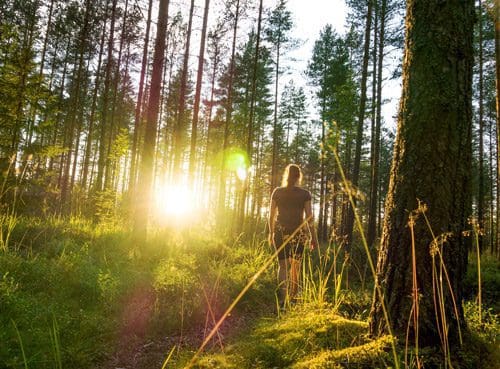Have you ever noticed that spending time in nature can make you feel peaceful and calm? Although being surrounded by the beauty of nature benefits everyone, for those with a substance use disorder, nature has a healing effect. The therapeutic use of nature is called ecotherapy.
What is Ecotherapy?
The foundational premise of ecotherapy is that all people are deeply connected to nature. As a holistic therapy, ecotherapy focuses on an individual’s mental and physical state. Just as addiction affects the entire person–mind, body, and spirit–so does a therapeutic connection to nature calm and center a person on all levels.
Ecotherapy is also referred to as:
- Green therapy
- Nature therapy
- Earth-centered therapy
An Emerging Field of an Old Belief
Ecotherapy is the applied science of ecopsychology, which studies the relationship between people and the natural world using psychological and ecological principles. Ecotherapists believe that each person is part of the whole and that their subconscious, or psyche, is part of the environment, The two cannot be separated. Therefore, nurturing a relationship with the environment and nature is essential for healing.
The term ecopsychology was coined by Theodore Roszak, a California professor, in his book The Voice of the Earth in 1992 to show the connection between mental health and ecological health. Yet the therapeutic benefits of nature are seen throughout history in both Eastern and Western cultures.
The Benefits of Ecotherapy
It is known that spending time in the sunlight and fresh air is a good way to boost your mood. Studies have shown that sunlight decreases symptoms of depression and helps with seasonal affective disorder (SAD). In an article in the Atlantic titled The Nature Cure, the author explains that camping programs decrease relapse rates in people with substance abuse disorders.
There have been many conclusive studies that have shown the benefits of ecotherapy including:
- A study in the UK that found that taking a walk in a country setting reduced depression in 71 percent of the people participating.
- Web MD reports a study that found that self-esteem, mood, and motivation improved after spending as little as five minutes in a natural setting.
- A Japanese study of shinrin-yoku which means “forest bathing” or “taking in the forest atmosphere” has found that stress is reduced by many different elements of the environment, such as smelling the scent of flowers and wood, hearing the sound of water, and seeing natural landscapes and scenery. Participants in the study had a reduced pulse, lowered blood pressure, and lower levels of cortisol.
- Psychology Today reports that studies show that ecotherapy is just as effective as medication for treating depression in some people.
Ecotherapy Techniques and Activities
Sometimes, ecotherapy is done by an individual and other times it is guided by a therapist or practitioner. Activities may include only one person or a group. A session can last a few minutes or cover a time span of days or weeks. Although ecotherapy is generally done outside, certain activities can take place indoors.
The following are some of the more common forms of ecotherapy:
- Physical exercise that takes place in a natural environment such as jogging, cycling, walking, swimming, or doing yoga in a park to reduce anger, stress, anxiety, and depression.
- Taking part in conservation activities to create a sense of hopefulness and purpose.
- Pet or equine therapy, such as playing with or petting a dog, to help reduce agitation and aggressiveness.
- Horticultural therapy, including growing your own garden, to foster feelings of worthiness and promote well-being.
- Group nature meditation to promote feelings of self-esteem and self-respect.
Play an outdoor game, visit a botanical garden, go on a hike, sit in a park and read a book, or take up bird watching: there are lots of things to do outdoors that will give you the benefits of nature.
If you are not able to be outside, practice visualization exercises where you focus on a favorite outdoor setting in your mind such as an ocean beach with the waves rolling in, a field of wildflowers, or a lush forest. A few other ideas for indoor ecotherapy include:
- Looking at photos or paintings of natural scenes.
- Listening to pre-recorded nature sounds.
- Writing about the changes of the seasons.
- Growing houseplants.
Help is Available
At Canyon Vista Recovery Center in Mesa, Arizona, where we enjoy more than 300 sunny days a year, we understand the power of nature in the recovery process and encourage our clients to spend time in our beautiful outdoor spaces. If you or a loved one is suffering from an addiction to drugs or alcohol, there is help available. Call and speak to a professional staff member who can answer your questions and explain our program. By combining clinical, holistic, and psychiatric care, we provide our clients with the tools they need to begin their journey to a clean and sober life.
Learn more about programs offered at Canyon Vista Recovery Center, inpatient treatment in Arizona.
Contact us at
(888) 979-1840
Source
psychologytoday.com/ca/blog/out-the-darkness/201204/the-power-nature-ecotherapy-and-awakening










